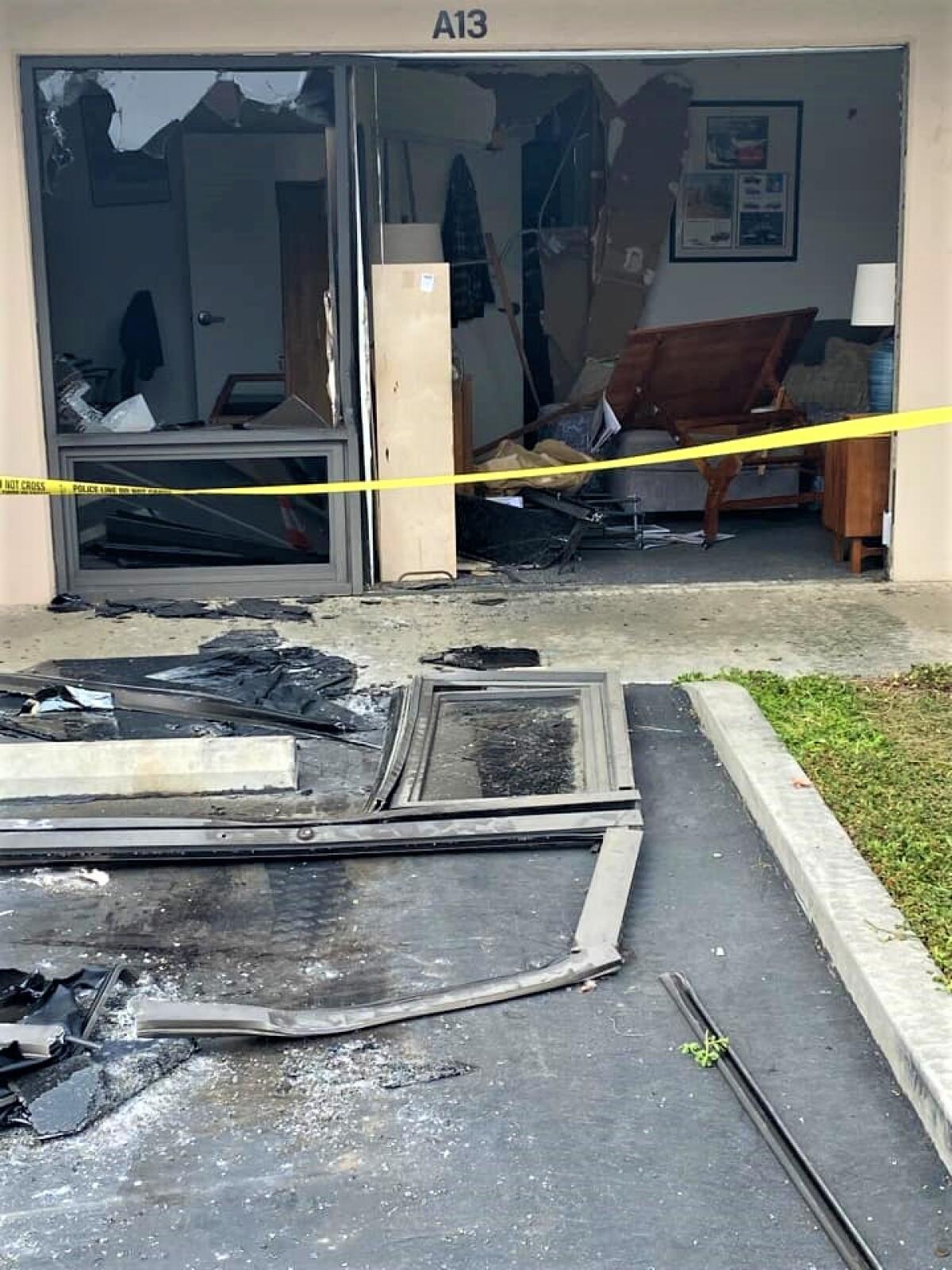Man accused of shooting at police and DOJ agents resulting in Costa Mesa standoff deemed incompetent to stand trial

- Share via
A man facing charges including attempted murder and assault on a peace officer related to an eight-hour standoff in Costa Mesa announced he wanted to fire his attorney on Wednesday in the middle of a hearing shortly before he was found mentally unfit to stand trial.
The decision from Judge Michael A. Leverson was based largely on the testimony of Dr. John Richard Slosar, a psychologist who was supposed to interview Luis Mendez Jr., 50, of Whittier, after he was taken into custody Oct. 7. The defendant was accused of shooting at Costa Mesa police and California Department of Justice agents attempting to serve a firearms-related warrant at his metal fabrication business on the 1700 block of Monrovia Avenue. At the time, he was prohibited from owning a gun due to a previous misdemeanor domestic violence conviction.
Mendez refused at the time to be questioned by Slosar or enter a plea of either guilty or not guilty in response to the most recent misdemeanor and eight felonies filed against him. Instead, ignoring the advice of public defender Richard Cheung, he insisted that the case be dismissed on the grounds of technical discrepancies and because he asserts he acted in self defense.
On Tuesday, Cheung asked his client what he would do if such a motion were filed and then declined. Mendez responded by accusing the justice system, an attorney who represented him in a prior case, the victim in the domestic violence case he had been convicted of and others of “railroading” and unjustly imprisoning him. Witnesses said he believed a former romantic partner was working with a member of the state Department of Justice to infringe on his rights and cause legal trouble for him.
People who called Mendez a friend testified that he was exceptionally skilled as a metal fabricator and hunting pathfinder. They said he was usually able to have intelligent conversations about mundane or technical topics.
However, they also said he harbored conspiracy theories, thought the government had too much control over individuals and that people should be free to ignore laws they see as unjust. They added that whenever he attempted to explain those beliefs to them, his reasoning was often difficult to follow or illogical.
Witnesses said the defendant was convinced he shared a lineage with Jesus Christ and the former rulers of Mexico and that he had been anointed to serve a special role in history. Mendez reiterated these claims while testifying on Tuesday, adding that his research came from Wikipedia and “common knowledge.”
Deputy Dist. Atty. David McMurrin said no evidence was presented in court to counter Mendez’s assertions of noble ancestry. So, witnesses could only assume he was being delusional in making those claims.
Friends noted that Mendez was deeply religious. McMurrin pointed out that it is common for Christians to consider themselves and all people to be made in the likeness of Jesus.
McMurrin went on to suggest that it would be reasonable for a person with no formal legal training who thinks they have been unfairly arrested to feel frustrated and even ramble while speaking during court proceedings. He also suggested that the defendant’s refusal to be arraigned was a conscious attempt to evade the charges he was facing. That and Mendez’s efforts to find a different attorney were proof he had the intellectual capacity to understand the proceedings against him, McMurrin said.
The prosecutor further argued that Mendez might be capable of cooperating with a lawyer whose views were more similar to his own. He added that those who disagreed with the law and how it should be applied, such as those who distrust the government, weren’t inherently unfit for trial because of their unconventional beliefs.
During questioning, Slosar said he had spoken with self-described “sovereign citizens” on several occasions.
“I see a lot of people ramble, but I am able to bring them back to the question,” Slosar said. “But when asked to explain his beliefs, the defendant goes on and on, the question never gets answered, and it’s infused with paranoia.”
The psychologist was present when Mendez, his mother and some friends testified. Slosar said based on what he saw and statements provided by investigators and people who knew the defendant, he believed the accused was delusional and paranoid. He concluded that those conditions would likely prevent him from assisting Cheung or any other attorney assigned to defend him.
McMurrin pointed out that Slosar spoke to Mendez for less than five minutes before forming his initial recommendations, which were partly based on reports written by witnesses and investigators who were not trained mental health professionals. The prosecutor asked the psychologist if he would still consider the defendant unfit for trial based solely on the testimony given while he was in the courtroom. Slosar said he would.
Leverson asked Slosar to define “delusional.” The doctor replied: “It’s when you present ideas that are obviously false as true.”
Mendez was heard snickering and seen shaking his head as Slosar and others spoke from the stand.
“A person might believe everyone is out to get him, and so he maybe starts to stockpile weapons,” Slosar continued. “And the next thing you know, the SWAT team is outside.”
Slosar concluded his testimony on Wednessday. Cheung began making his closing arguments a short time later but was interrupted by his client.
“I’m firing you right now!” Mendez said.
Proceedings were halted so a special hearing could be held in private between Mendez, Leverson and Cheung. The courtroom was reopened, the defense attorney was allowed to finish submitting his case, and the judge ultimately ruled in his favor.
Now, Mendez’s fate lies in the hands of the Orange County Health Care Agency, which will decide whether he needs to be committed to an institution, treated as an outpatient or receive some other form of care for his mental health condition or conditions.
If at some time in the future Mendez is found competent to assist in his own defense, the case may be brought back to court.
All the latest on Orange County from Orange County.
Get our free TimesOC newsletter.
You may occasionally receive promotional content from the Daily Pilot.










